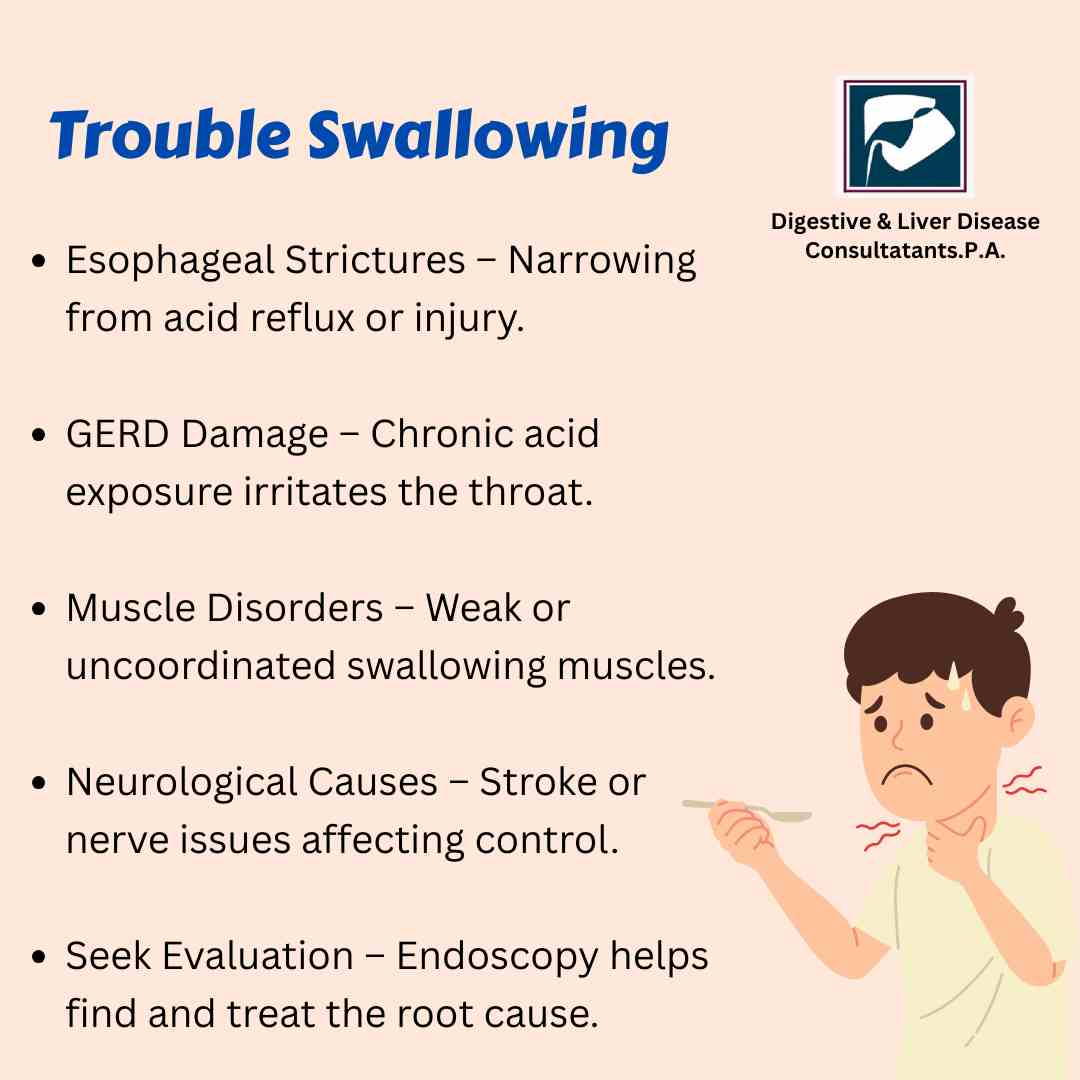Swallowing is something most of us do without thinking—until it becomes difficult. If you often feel like food is getting stuck in your throat or have pain while swallowing, you may be experiencing a condition called dysphagia. This problem can range from mild discomfort to serious health issues that need medical attention.
In this blog, we’ll explain why swallowing problems happen, what symptoms to look for, and when to seek help from a gastroenterologist.
What Is Dysphagia?
Dysphagia is the medical term for difficulty swallowing. It can affect your ability to swallow food, liquids, or even saliva. For some people, it may feel like food moves slowly down the throat, while others may cough or choke frequently while eating.
There are two main types of dysphagia:
Oropharyngeal dysphagia: Trouble starting to swallow due to problems in the mouth or throat.
Esophageal dysphagia: Food feels stuck or delayed while moving down the esophagus (the tube that connects your throat to your stomach).

Common Symptoms of Swallowing Difficulties
If you are having trouble swallowing food, you may notice:
- Pain or discomfort while swallowing
- Coughing or choking during meals
- Feeling that food is stuck in the chest or throat
- Regurgitation of food or liquids
- Frequent heartburn or acid reflux
- Unexplained weight loss
- Hoarseness or sore throat that doesn’t improve
These symptoms should not be ignored, especially if they persist or worsen over time.
Possible Causes of Trouble Swallowing Food
Several conditions can cause swallowing difficulties. Some are minor and temporary, while others may require medical treatment.
1. Gastroesophageal Reflux Disease (GERD)
GERD is one of the most common causes of swallowing trouble. Frequent acid reflux can irritate and narrow the esophagus, leading to esophagitis or esophageal strictures. This makes it difficult for food to pass smoothly.
2. Esophageal Stricture
Chronic acid exposure or inflammation can cause scar tissue to build up in the esophagus, making it narrow. This can lead to pain and a feeling of food getting stuck.
3. Hiatal Hernia
A hiatal hernia occurs when part of the stomach pushes up into the chest cavity. It can cause reflux symptoms and swallowing discomfort.
4. Esophageal Motility Disorders
Conditions like achalasia or esophageal spasms affect the movement of the esophagus. In achalasia, the muscles fail to relax, making it hard for food to enter the stomach.
5. Neurological Disorders
Diseases that affect the brain and nerves—such as Parkinson’s disease, multiple sclerosis, or stroke—can interfere with the swallowing process.
6. Infections or Inflammation
Certain infections (viral, bacterial, or fungal) can cause inflammation in the throat or esophagus, leading to temporary swallowing problems.
7. Throat or Esophageal Cancer
In rare cases, persistent trouble swallowing may be an early sign of cancer in the throat or esophagus. Early detection is crucial for better treatment outcomes.
When to See a Doctor
It’s normal to occasionally have trouble swallowing, especially when you eat too quickly or don’t chew food well. However, you should see a doctor if you experience:
- Difficulty swallowing that lasts more than a few days
- Pain or tightness in the chest when eating
- Unintentional weight loss
- Coughing or choking during meals
- Blood in vomit or stools
- Frequent heartburn or regurgitation
Prompt evaluation can help identify the cause and prevent complications such as malnutrition, dehydration, or aspiration (when food enters the lungs).
Diagnosis of Swallowing Problems
If you visit a gastroenterologist, they may recommend several tests to determine the cause of your symptoms, including:
- Endoscopy (EGD): To view the inside of your esophagus and stomach.
- Barium Swallow Test: X-rays taken while swallowing a contrast liquid to assess esophageal movement.
- Esophageal Manometry: Measures the muscle contractions in your esophagus.
- pH Monitoring: Tests for acid reflux levels.
These diagnostic tools help doctors find out whether your swallowing difficulty is due to structural, muscular, or neurological causes.
Treatment Options
Treatment depends on the cause of your swallowing difficulty:
- For GERD or inflammation: Acid-suppressing medications or dietary changes can help.
- For esophageal strictures: A procedure called esophageal dilation gently widens the narrowed area.
- For achalasia or motility disorders: Treatments include medications, endoscopic procedures, or surgery to improve muscle function.
- For neurological causes: Speech or swallowing therapy can help retrain swallowing muscles.
- For cancer or tumors: Early detection allows for surgical, radiation, or chemotherapy options.
Your gastroenterologist will tailor the treatment plan based on your diagnosis and overall health.
How to Manage and Prevent Swallowing Difficulties
While not all causes can be prevented, these steps may help protect your esophagus and reduce discomfort:
- Eat slowly and chew food thoroughly
- Avoid very hot, spicy, or acidic foods
- Stay upright for at least 30 minutes after meals
- Maintain a healthy weight to reduce acid reflux
- Limit alcohol, caffeine, and smoking
- Stay hydrated to keep throat tissues moist
A healthy lifestyle combined with medical guidance can make a big difference in long-term digestive wellness.
About Digestive & Liver Disease Consultants, P.A.
At Digestive & Liver Disease Consultants, P.A., we provide advanced, compassionate care for patients with all types of gastrointestinal and liver conditions. Our board-certified gastroenterologists use state-of-the-art diagnostic technology and personalized treatment plans to help patients achieve better digestive health.
We specialize in treating conditions such as acid reflux, swallowing disorders, IBS, IBD, liver disease, and more. Our mission is to improve your health and quality of life through expert, evidence-based care.
Conclusion
Trouble swallowing food should never be ignored. While it may be caused by something minor like acid reflux, it can also be a sign of a more serious underlying condition. Getting evaluated early can prevent complications and ensure proper treatment.
If you’re having frequent difficulty swallowing or notice food getting stuck in your throat, schedule a consultation with Digestive & Liver Disease Consultants, P.A. Our best gastroenterologists will help identify the cause and provide effective, personalized treatment to restore your comfort and confidence while eating.






